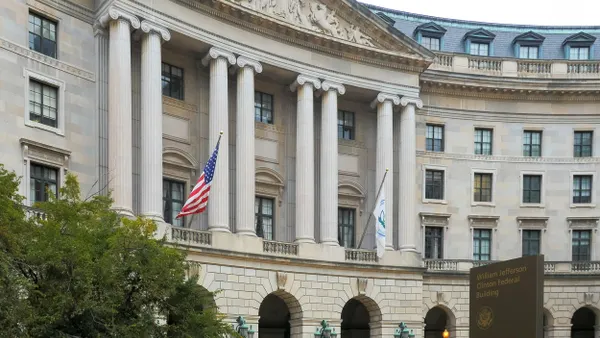Dive Brief:
- The board of county commissioners in Miami-Dade County, Florida, voted on Wednesday to reaffirm their commitment to building a new “waste-to-energy facility” for the county's garbage. But they also tweaked county policy regarding where the facility would be located and how much waste it would likely be designed to accept.
- Former frontrunner locations, including the decommissioned Opa-Locka West Airport and the Doral site where the county's previous refuse-derived fuel facility burned down, are now excluded from consideration for a new facility. The county also now requires that a WTE facility be at least half a mile from any residential area.
- The commissioners also voted on Wednesday to approve a goal to divert 40% of the county's waste from disposal and towards recycling and composting. The county mayor's office received expressions of interest from several major waste companies, including Reworld and FCC Environmental Services.
Dive Insight:
It's been more than two years since the county's refuse-derived fuel facility run by Covanta, now Reworld, burned and closed down. Officials have debated whether a WTE facility was necessary or safe for residents since, but ultimately decided the quantity of waste produced in Miami-Dade necessitated WTE. The county is shipping a portion of its waste elsewhere to a landfill via rail.
In February, the board of county commissioners instructed the county mayor to solicit proposals from companies interested in building a WTE facility, giving the mayor’s office 120 days to come back with a report. Mayor Daniella Levine Cava had previously advocated for a new facility, but later backed away from that position after receiving pushback from environmental groups and neighbors to proposed sites.
About two-thirds of the county's waste is made up of organics or recyclable materials, Commissioner Raquel Regalado said during the hearing, citing a county waste characterization study.
Regalado sponsored the motion to set a goal of 40% of waste diverted from disposal, saying diversion should be an essential part of any future waste plans.
"We should focus not just on what they're going to burn, but we should also have other companies that are doing this work," Regalado said. "We cannot rely on just one company to do all of it."
During debate Wednesday, commissioners expressed frustration with the slow process to identify a site and move forward with commissioning a new facility. The county has extended or expanded contracts to landfill its waste in order to make up for the lost disposal capacity, but it will lose that added capacity in about 10 years.
County Board Chair Anthony Rodriguez said officials "have to stop playing games and NIMBYism" with the county's waste capacity.
"If we continue to exclude properties, where is the garbage going to go?" he said. "We have to make a decision."
The county mayor's office commissioned AtkinsRealis to prepare a market research report. The consultant reached out to various waste and recycling companies around the country, and received responses from six businesses and consortiums interested in operating a waste-to-energy facility for the county.
Two consortiums said they could create solid waste campuses for the county. One, led by FCC Environmental Services, proposed a 1 million ton-per-year WTE facility that includes bulk and C&D waste recycling, composting, MRF recycling and landfilling. The proposal would need 50 to 80 acres, and the WTE facility would cost $1.5 billion to $1.9 billion.
Florida Power & Light and Reworld also submitted a proposal through a consortium, though they did not submit a cost estimate. Their proposal included 1.3 tons per year of WTE capacity, plus anaerobic digestion with composting and landfilling.
Several other major waste companies pitched landfilling and other technologies to contribute to the county’s waste disposal capacity, including WM, Waste Connections, GFL Environmental and Synagro.
The resolution gives the county mayor's office 90 days to bring back a recommendation and proposed location for a WTE facility. The county has previously pursued a waste campus where multiple functions are present, but commissioners are providing the county mayor with more flexibility to pursue a smaller campus and have other recycling functions in other sites.
Beyond WTE plans, the board also instructed the county mayor to pursue recycling capacity for a variety of materials, including organics.












